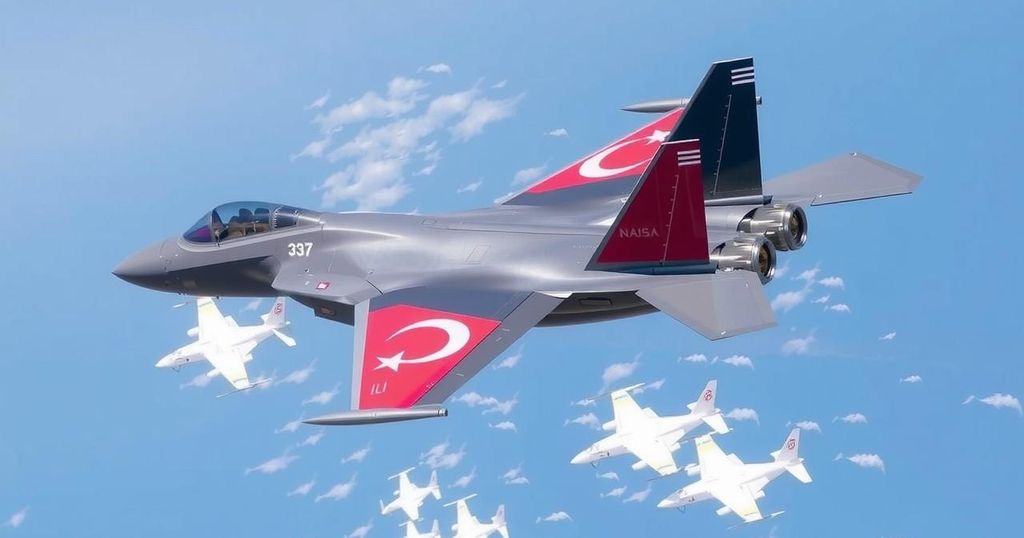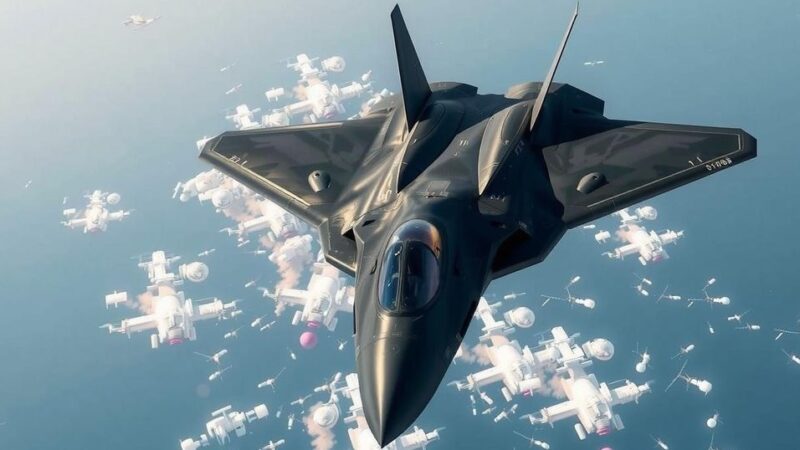Saudi Arabia is negotiating a deal to acquire 100 Kaan fighter jets from Turkey, as access to U.S.-made F-35s remains restricted. The discussions focus on procurement, technology transfer, and joint production, with deliveries expected in the 2030s. This initiative is part of Saudi Arabia’s strategy to diversify its defense procurement sources amid ongoing geopolitical challenges. The Kaan program reflects Turkey’s growing role as a defense exporter and partner for nations seeking advanced military technologies.
Recent negotiations indicate that Saudi Arabia is seeking to acquire up to 100 Kaan fifth-generation fighter jets from Turkey, as the United States continues to restrict access to its F-35 aircraft. The discussions were conducted during a three-day meeting in Istanbul, where senior officials from both nations examined possible procurement strategies, technology transfer, and joint production agreements. Anticipated deliveries of the Kaan aircraft are expected in the 2030s, enhancing Saudi Arabia’s defense capabilities while supporting the Turkey’s aim to establish itself as a strong player in the global defense sector.
This potential acquisition represents a pivotal step for Saudi Arabia, which has been actively pursuing alternatives to U.S. defense systems due to challenges in obtaining F-35 jets, stemming from U.S. geopolitical concerns. Previous agreements, including a $3.1 billion deal for 60 Baykar AKINCI unmanned combat aerial vehicles, underline a strong inclination towards diversifying defense procurement sources. Moreover, these conversations signal a growing bilateral defense relationship between Saudi Arabia and Turkey, aiming at technological collaboration and regional security enhancements.
The Kaan fighter jet, developed by Turkish Aerospace Industries, is designed to fulfill roles in air superiority and multirole operations. Its advanced features include stealth capabilities, supercruise ability, and indigenous munitions. The program, initiated in 2016 with significant investment, seeks to ensure local production and technology ownership, reflecting Turkey’s intent to transition towards a self-sufficient defense industry. With prospective collaboration between Saudi investigators and Turkish authorities, the Kaan’s production may embody both technological advancement and mutual benefit for both nations.
Additionally, the Turkish Air Force is undergoing modernization and integration of advanced warfare concepts, including the operational use of unmanned systems which plays a key role in the future of aerial combat. The introduction of the Kaan aligns with regional defense strategies emphasizing increased operational capabilities amidst evolving security challenges.
The development of Turkish defense industries follows a historical context wherein Turkey sought to reduce dependence on foreign supplies after facing restrictions in prior decades. The establishment of robust domestic manufacturing capabilities, exemplified by companies such as Baykar and TAI, has been crucial in navigating these challenges, allowing Turkey to emerge as a notable defense exporter and strategic partner for nations including Ukraine. This strategic shift underscores the dual objective of enhancing national security while fostering economic growth through defense exports.
The context of Saudi Arabia’s pursuit of Turkish Kaan fighter jets highlights a significant shift in the defense procurement landscape, driven largely by the inability to secure U.S.-made F-35s due to various geopolitical constraints. The ongoing discussions between Saudi and Turkish officials reflect a broader trend of nations seeking to diversify their military supplies, particularly in light of regional tensions and the imperative of achieving self-sufficiency in defense production. The Kaan program, which aims to enhance Turkey’s domestic defense capabilities, represents an opportunity for Saudi Arabia to modernize its air force while simultaneously reinforcing Turkey’s status as an emerging player in the global defense market.
In summary, Saudi Arabia’s negotiations for the purchase of 100 Kaan fighter jets from Turkey marks a critical development in both countries’ military strategies. As Saudi Arabia aims to modernize its air capabilities amid restrictions on U.S. arms, this agreement potentially opens new avenues for defense cooperation and technology exchange with Turkey. The Kaan jet symbolizes Turkey’s advancing defense industry and illustrates a significant pivot towards indigenous military solutions, enhancing both national security and international relations in an increasingly competitive defense arena.
Original Source: armyrecognition.com







